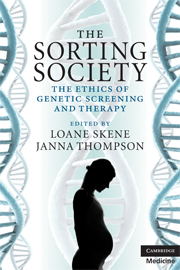Book contents
- Frontmatter
- Contents
- List of contributors
- Preface
- 1 Introduction
- 2 Genetic testing, an informed choice
- 3 Sex selection: sorting sperm as a gateway to the sorting society?
- 4 Cloning to avoid genetic disease
- 5 Procreative Beneficence: reasons to not have disabled children
- 6 Reprogenetic technologies: balancing parental procreative autonomy and social equity and justice
- 7 Genetic technology and intergenerational justice
- 8 Genetic preselection and the moral equality of individuals
- 9 Genes, identity and the ‘expressivist critique’
- 10 Overstating the biological: geneticism and essentialism in social cloning and social sex selection
- 11 The sorting society: a legal perspective
- Index
- References
5 - Procreative Beneficence: reasons to not have disabled children
Published online by Cambridge University Press: 16 September 2009
- Frontmatter
- Contents
- List of contributors
- Preface
- 1 Introduction
- 2 Genetic testing, an informed choice
- 3 Sex selection: sorting sperm as a gateway to the sorting society?
- 4 Cloning to avoid genetic disease
- 5 Procreative Beneficence: reasons to not have disabled children
- 6 Reprogenetic technologies: balancing parental procreative autonomy and social equity and justice
- 7 Genetic technology and intergenerational justice
- 8 Genetic preselection and the moral equality of individuals
- 9 Genes, identity and the ‘expressivist critique’
- 10 Overstating the biological: geneticism and essentialism in social cloning and social sex selection
- 11 The sorting society: a legal perspective
- Index
- References
Summary
The reasonable man adapts himself to the world; the unreasonable one persists in trying to adapt the world to himself. Therefore all progress depends on the unreasonable man.
Introduction
Couples (or single reproducers) have a moral obligation to strive to have disability-free children. Disability is sometimes argued to be a social construction. It is said that disability should be removed by altering social institutions and circumstances. At least in some circumstances, I argue that biopsychosocial correction of disability is needed, where disability is removed by altering our biology or psychology, or selecting our children.
The principle of Procreative Beneficence
In a previous paper, I sketched what I called the principle of Procreative Beneficence:
couples (or single reproducers) should select the child, of the possible children they could have, who is expected to have the best life, or at least as good a life as the others, based on the relevant, available information.
This principle is novel in one way. It claims that we have a good reason to select which child we have. Many people deny this. They claim we should not select our children. According to folk morality, we should accept whichever child Nature or God gives us as a gift. There is a significant distance between the principle of Procreative Beneficence and folk morality. Can Procreative Beneficence be defended?
There are many objections to this principle. I will address these. But let me first clarify this principle and give an expanded formulation.
- Type
- Chapter
- Information
- The Sorting SocietyThe Ethics of Genetic Screening and Therapy, pp. 51 - 68Publisher: Cambridge University PressPrint publication year: 2008
References
- 4
- Cited by

